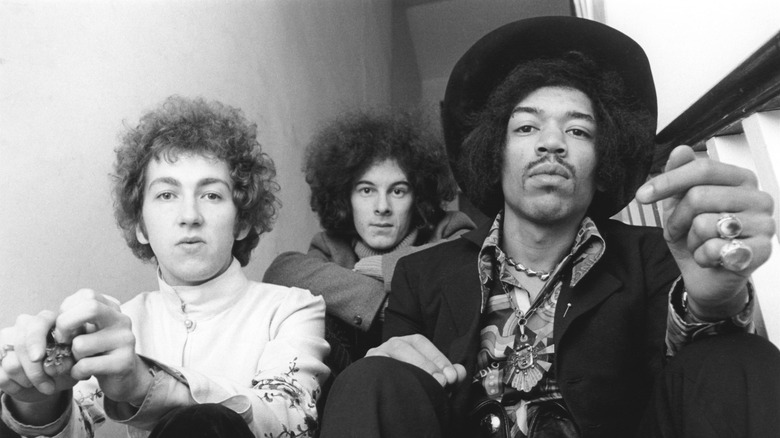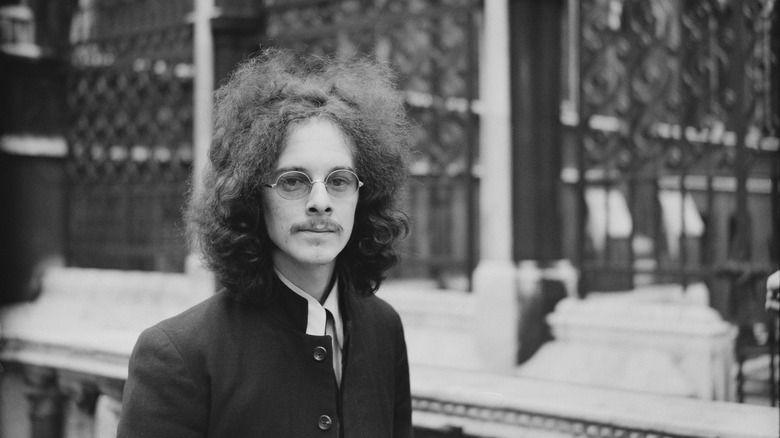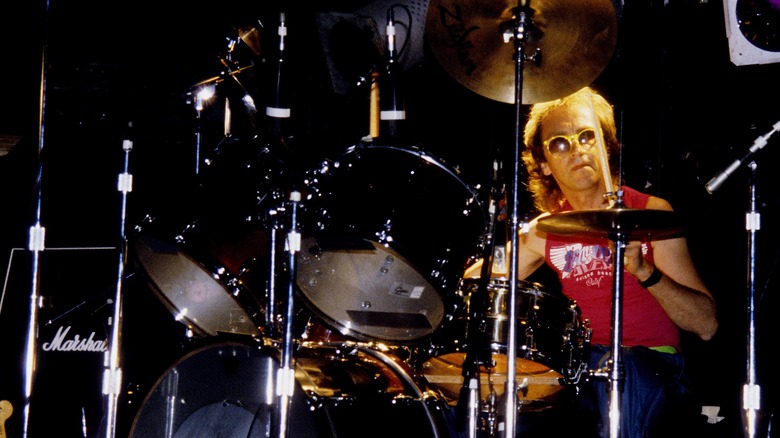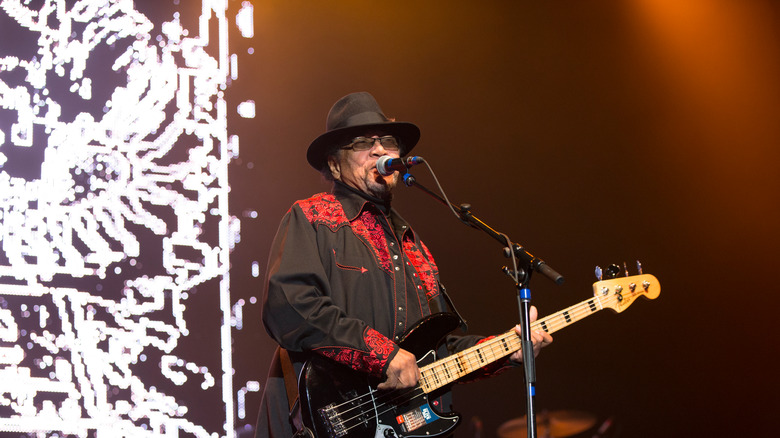What Jimi Hendrix's Ex-Band Members Really Thought Of Him
We may receive a commission on purchases made from links.
Musician James Marshall "Jimi" Hendrix is one of the most legendary guitar players of all time. Even if you're not a big music buff, you've probably heard his name time and time again and know exactly what shot him to fame. It was the formation of his rock band the Jimi Hendrix Experience in 1966 that began it all. The group consisted of Hendrix, drummer Mitch Mitchell, and bassist Noel Redding, with Billy Cox later replacing him for a brief time. Though they lasted just under three years, putting out three albums from 1966 to 1969, they're still revered in the echelons of music history.
Like many celebrities that live on as legends, the details of Hendrix's life and personality are the subject of curiosity and scrutiny. Over the years, Mitchell, Redding, and Cox have shed more light on the man behind the guitar. Not all is positive, but overall the portrait they paint is similar, and one not uncommon for an artist of his caliber. Here's what Jimi Hendrix's ex-band members really thought of him.
A chaotic Hendrix experience
Bassist Noel Redding has perhaps been the most vocal about his criticisms of Jimi Hendrix. Speaking to Bass Player in 1993, the bassist suggested that working with the virtuoso guitar player was a bit stressful, to say the least. "The recording sessions were chaos, and on stage, it was getting ridiculous," he said. According to Redding, Hendrix was stubborn in his refusal to play old songs, as the audience often wanted. "The last straw came at the Denver Pop Festival when Jimi told a reporter that he was going to enlarge the band," Redding said. "I went up to Jimi that night, said goodbye, and caught the next plane back to London. Jimi phoned and asked me to come back, but I said stuff it."
Redding and drummer Mitch Mitchell ended up in lengthy legal battles with Hendrix's estate over royalties and copyrights, and as of this writing they are still ongoing (at the behest of their respective estates). Yet the bassist claims to harbor no ill will toward the legendary guitar player. "I don't want you to think there's anything nasty between Jimi and I," he told Bass Player. "We were still good friends. It's just that we couldn't work together anymore."
A tireless work ethic
Similar to Noel Redding, drummer Mitch Mitchell seemed to look fondly on the guitarist all things considered. Back in fall 2000, Experience Hendrix Magazine included an interview with Mitchell (now on the official Jimi Hendrix website). He spoke about Hendrix's work ethic in an admiring way, though he acknowledged it could cause friction with some in their crew. "Jimi could be a manager's worst nightmare, because he would live in the recording studio given half the chance," Mitchell said. "But maybe that was the right thing. Jimi was just starting to give himself a chance to expand."
The drummer also touched on the Jimi Hendrix Experience's performance at the infamous Isle of Wight Festival in 1970, which was marred by hecking, anarchists, and fire. Some fans even broke down barriers to get into the event without paying. The entire disaster was a snapshot of the poor planning common with such festivals at the time. As for the Jimmy Hendrix Experience, they faced technical problems, and the guitarist was also reported to have been in a bad state, physically and mentally.
Mitchell shed some light on such claims in his interview. "It was just a bad gig, quite honestly," he said. "I can't say if Jimi's heart was in it. ... You know, Jimi had so much on his mind with the opening of Electric Lady. Maybe in his heart he just wanted to be there, quite honestly." In Tony Brown's "Hendrix: The Final Days," Hendrix's girlfriend of the time, Kirsten Nefer, suggested he was not in the best place mentally. "He was so afraid of going on the stage, and all these people, all of a sudden he felt trapped you know, in this little caravan and getting his clothes on," she said.
'Like Mozart'
The idea that brilliant people die young is one that continues today. "The 27 Club" is commonly used to refer to popular musicians and artists who died at 27. Psychology Today explored the idea in the article "Dead at 27: Why Highly Creative People Die Young" (psychologist and author Nigel Barber said it could be any number of things, from confirmation bias to drug abuse to the stresses of fame). Billy Cox, who played bass with Jimi Hendrix in Gypsy Sun and Rainbows and later the Jimi Hendrix Experience, seems to think his former bandmate's brilliance was a factor in his death. "I don't think it was the partying," he said in an interview with Bass Player. "It was just ... to be. If you look at geniuses like Mozart, they don't live long. They come to do their thing, and then they're gone."
Cox also played the legendary Woodstock show with Gypsy Sun and Rainbows in August 1969, in Bethel, New York. "It was the first big gig I played with Jimi," he said. "We came around the back way and looked out on that crowd — it was the largest crowd I'd ever played in front of." Hendrix died the next year on September 18, 1970, and Cox was deeply affected by his passing. "Jimi's death devastated me, but then reality kicked in — we all have to do that. I'll have to make my transition also," he said. As of this writing, Cox is the only surviving member of the Jimi Hendrix Experience.



